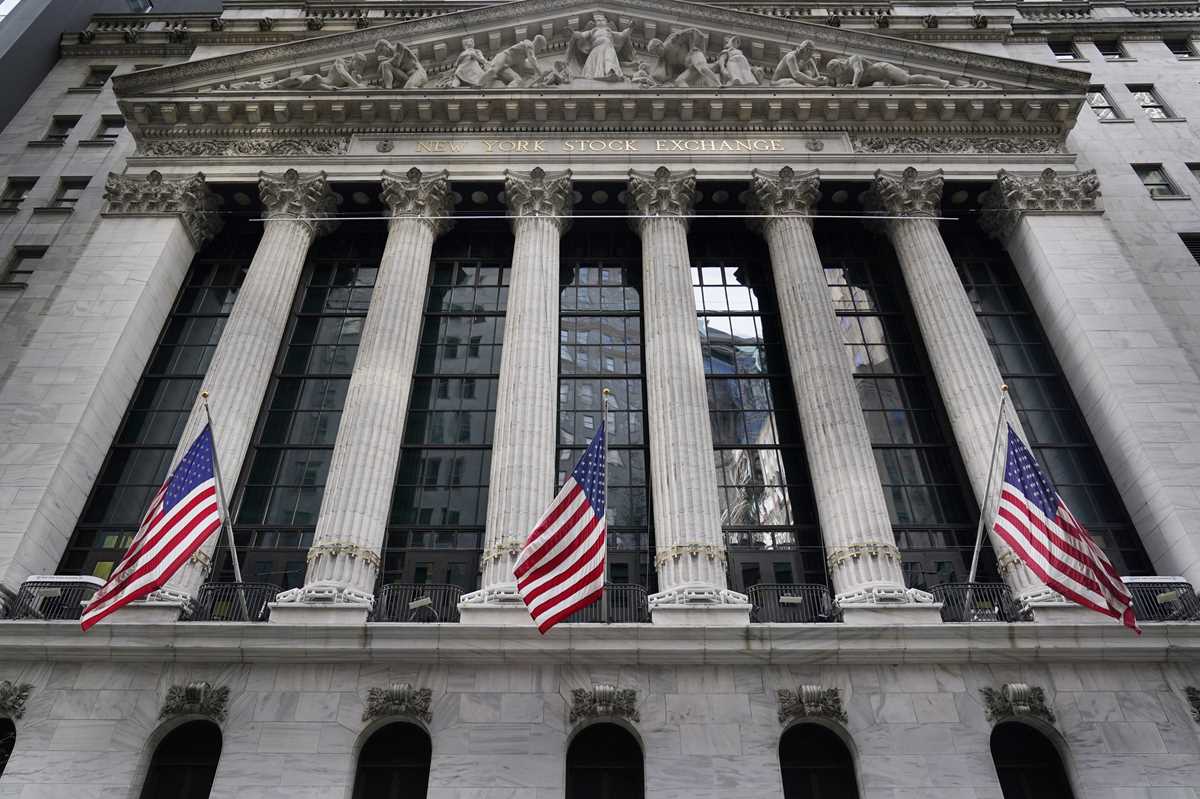 This Nov. 23, 2020 file photo shows the New York Stock Exchange in New York. Stocks are opening lower on Wall Street Tuesday, Sept. 28, 2021, led by more declines in Big Tech companies. (AP Photo/Seth Wenig, File)
This Nov. 23, 2020 file photo shows the New York Stock Exchange in New York. Stocks are opening lower on Wall Street Tuesday, Sept. 28, 2021, led by more declines in Big Tech companies. (AP Photo/Seth Wenig, File)Technology companies led a broad sell-off in stocks on Wall Street Tuesday, putting the S&P 500 index on track for its biggest drop since May.
The benchmark index fell 1.9% as of 1:23 p.m. Eastern. The Dow Jones Industrial Average fell 531 points, or 1.5%, to 34,339 and the tech-heavy Nasdaq fell 2.6%. Decliners outnumbered gainers on the New York Stock Exchange by 4 to 1.
The center of Wall Street’s action was again in the bond market, where a swift rise in Treasury yields is forcing investors to reassess whether prices have run too high for stocks, particularly the most popular ones.
The yield on the 10-year Treasury note, a benchmark for many kinds of loans including mortgages, jumped to 1.53%. That’s its highest level since late June, and up from 1.48% late Monday and 1.32% a week ago.
A rise in yields means Treasurys are paying more in interest, and that gives investors less incentive to pay high prices for stocks and other things that are riskier bets than super-safe U.S. government bonds. The recent upturn in rates has hit tech stocks particularly hard because their prices look more expensive than much of the rest of the market, relative to how much profit they’re making.
Many tech stocks also got bid up recently on expectations for big profit growth far in the future. When interest rates are low, an investor isn’t losing out on much by paying high prices for the stock and waiting years for the growth to happen. But when Treasurys are paying more in the meantime, investors are less willing.
This week’s swoon for the market is reminiscent of an episode early this year when expectations for rising inflation and a stronger economy sent Treasury yields climbing sharply. The 10-year yield jumped to nearly 1.75% in March after starting the year around 0.90%. Tech stocks also took the brunt of that downturn.
Chipmaker Nvidia fell 3.9% and Microsoft fell 2.9%. The broader technology sector has also been contending with a global chip and parts shortage because of the virus pandemic and that could get more severe as a power crunch in some parts of China shuts down factories.
Communications companies also weighed down the market. Facebook fell 3.5% and Google's parent company, Alphabet, fell 3.4%.
Energy was the only sector in the S&P 500 that wasn't in the red. Exxon Mobil rose 1.2% and Schlumberger gained 3.9% for the biggest gain among S&P 500 stocks.
Another lingering market worry resonating from China is the possible collapse of one of China’s biggest real estate developers. Evergrande Group is struggling to avoid a default on billions of dollars of debt.
Markets in Asia were mixed while markets in Europe fell.
Investors have been dealing with a choppy market in September as they try to gauge how the economic recovery will progress and how it will impact various industries. The S&P 500 is down 3.6% so far in September and is headed for its first monthly loss since January.
COVID-19 remains a lingering threat and is still taking its toll on businesses and consumers. Economic data on consumer spending and the employment market has been mixed. U.S. consumer confidence declined for the third straight month in September, according to a report from The Conference Board.
Companies are warning that supply chain problems and higher prices could crimp sales and profits. The Federal Reserve has maintained that rising inflation is temporary and tied to those supply chain problems as the economy recovers from the pandemic. Investors are still concerned that higher inflation could be more permanent and rising bond yields reflect some of those worries.
“The bottom line is that the supply chain thesis is really being tested and the Fed, businesses and consumers have had to react to some of the on-the-ground realities,” said, Eric Freedman, chief investment officer at U.S. Bank Wealth Management.
___
AP Business Writer Stan Choe contributed.
Before you consider Exxon Mobil, you'll want to hear this.
MarketBeat keeps track of Wall Street's top-rated and best performing research analysts and the stocks they recommend to their clients on a daily basis. MarketBeat has identified the five stocks that top analysts are quietly whispering to their clients to buy now before the broader market catches on... and Exxon Mobil wasn't on the list.
While Exxon Mobil currently has a "Moderate Buy" rating among analysts, top-rated analysts believe these five stocks are better buys.
View The Five Stocks Here
Click the link below and we'll send you MarketBeat's guide to investing in 5G and which 5G stocks show the most promise.
Get This Free Report